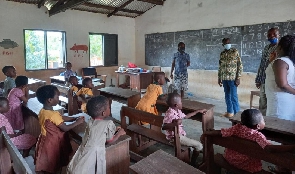 For primary education, improving literacy and numeracy is essential
For primary education, improving literacy and numeracy is essential
Basic education, covering kindergarten, primary, and junior high school, forms the foundation of Ghana’s human capital development. Under the leadership of John Dramani Mahama, practical, result-oriented reforms can be implemented to transform this critical sector.
The framework below offers strategic recommendations aimed at improving learning outcomes through well-targeted programs that foster holistic student development and lifelong learning skills.
A key area for reform is early childhood education. Currently, many young learners lack the essential foundational skills needed to thrive in primary school. To address this, a National Early Learning Enhancement Program (NELEP) should be introduced.
This program will deliver a standardized play-based curriculum designed to develop language, numeracy, and socio-emotional skills in young learners. Educators specializing in early childhood should be trained through a national certification program focused on child-centered pedagogy and continuous professional development.
A strong emphasis should also be placed on involving parents through early childhood support workshops, equipping them to reinforce learning at home.
For primary education, improving literacy and numeracy is essential. Despite years of formal schooling, many students fail to achieve basic proficiency in reading and arithmetic.
To address this, the government should launch the Reading Ghana Initiative (RGI) and the Math for Life Program (MLP). These programs should be designed to improve reading fluency, comprehension, and mathematical reasoning through evidence-based teaching methods.
Teachers should be equipped with innovative tools and resources to deliver engaging lessons that promote active learning. In addition to enhancing instruction, regular national assessments should be introduced to track student progress in literacy and numeracy, allowing for timely remedial interventions where necessary.
Junior high school reform should focus on preparing students for both higher education and the job market. A revised curriculum emphasizing practical skills, creativity, and innovation is necessary. The government should introduce the Junior Innovators Program (JIP), which integrates STEM education, coding, and digital literacy into junior high school curricula.
This program should offer students hands-on learning opportunities through science fairs, technology competitions, and problem-solving challenges. Additionally, the introduction of the Young Entrepreneurs and Vocational Skills Development Program (YEVSDP) will expose students to basic entrepreneurship, financial literacy, and vocational training in fields such as agriculture, carpentry, and ICT.
This dual academic and vocational pathway will enable students to either pursue further education or start small businesses upon completion of junior high school.
Teacher quality remains a critical factor in education reform. The Mahama government should introduce the Excellence in Teaching Initiative (ETI), which will focus on enhancing teacher performance through periodic professional development, mentorship programs, and performance-based incentives.
Under ETI, teachers will be evaluated on both their classroom effectiveness and their ability to foster critical thinking and creativity among students. In addition, a National Teachers’ Support Network (NTSN) should be established, offering peer-to-peer learning, access to teaching resources, and continuous professional development through workshops and online platforms.
School welfare programs play a significant role in ensuring that children remain in school and are motivated to learn. The Mahama administration should expand the School Feeding Enhancement Program (SFEP), focusing on delivering balanced and nutritious meals in all public basic schools.
Partnerships with local farmers and suppliers will ensure a steady supply of fresh produce while stimulating local economies. Moreover, the introduction of a Health and Well-being in Schools Program (HWSP) will prioritize the physical and mental well-being of students.
This program will provide regular health screenings, mental health support services, and hygiene education, ensuring students are healthy and ready to learn.
Another vital reform area is extracurricular activities, which help in the holistic development of students. The government should introduce the National Talent Development Program (NTDP) to promote sports, arts, and cultural activities in schools.
This initiative will help identify and nurture young talents in diverse fields beyond academics. Schools should also be encouraged to establish clubs and societies that promote leadership, teamwork, and community service.
Effective monitoring and evaluation of these reforms are key to achieving the desired outcomes. The Mahama administration should establish a Basic Education Performance Monitoring Unit (BEPMU) within the Ministry of Education.
This unit will oversee the implementation of reforms, track key performance indicators, and provide quarterly progress reports. Collaborating with civil society and international partners in the evaluation process will enhance transparency and foster stakeholder engagement.
In conclusion, the proposed reforms for Ghana’s basic education sector under the John Dramani Mahama administration focus on implementing relevant programs that directly address learning outcomes, teacher quality, and student well-being.
By adopting these evidence-based strategies and maintaining a strong commitment to education, the Mahama government can create a system that empowers every Ghanaian child with the skills, knowledge, and confidence to contribute meaningfully to national development.